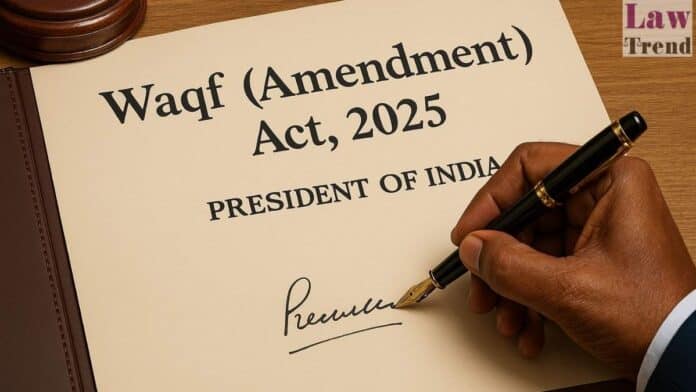New Delhi- In a significant development aimed at reforming the management and regulation of Waqf properties across India, President Droupadi Murmu has accorded her assent to the Waqf (Amendment) Act, 2025. The Act, which was passed by both houses of Parliament earlier this week, is designed to enhance transparency, accountability, and inclusivity in Waqf administration, marking a crucial step towards improving the socio-economic conditions of Muslims in the country.
Key Provisions of the Act
- Renaming and Reorganization: The Act renames the Waqf Act, 1995, as the Unified Management Empowerment Efficiency and Development (UMEED) Act. This rebranding reflects the government’s intent to modernize and streamline Waqf management.
- Inheritance Rights: The legislation ensures that women have equal inheritance rights over Waqf properties, aligning with broader efforts to promote gender equality and empower Muslim women.
- Diversification of Waqf Boards: In a move to foster greater inclusivity, the Act allows for the inclusion of non-Muslim members in Waqf boards. This provision is expected to bring diverse perspectives and expertise to the management of Waqf properties.
- Financial Transparency: The Act mandates that Waqf institutions earning more than ₹1 lakh annually undergo audits. This measure aims to increase financial transparency and prevent mismanagement of Waqf funds.
- Reduced Contributions: The legislation reduces the mandatory contributions of Waqf institutions to Waqf boards from 7% to 5%. This reduction is intended to ease the financial burden on smaller Waqf institutions, allowing them to allocate more resources towards community development and welfare projects.
Expected Impact
The Waqf (Amendment) Act, 2025, is anticipated to have a positive impact on the socio-economic conditions of Muslims by ensuring that Waqf properties are utilized effectively for the benefit of the community. The streamlined management and increased transparency are expected to prevent the misuse of Waqf assets and enhance their contribution to education, healthcare, and other social welfare initiatives.
Implementation Timeline
The implementation of the Act is expected to commence soon, following its notification by the government. Officials will work closely with state governments and Waqf boards to ensure a smooth transition and effective enforcement of the new provisions.
In conclusion, the President’s assent to the Waqf (Amendment) Act, 2025, marks a significant step forward in the reform of Waqf management in India. As the country moves towards more inclusive and transparent governance of Waqf properties, the potential for positive change in Muslim communities is substantial.




